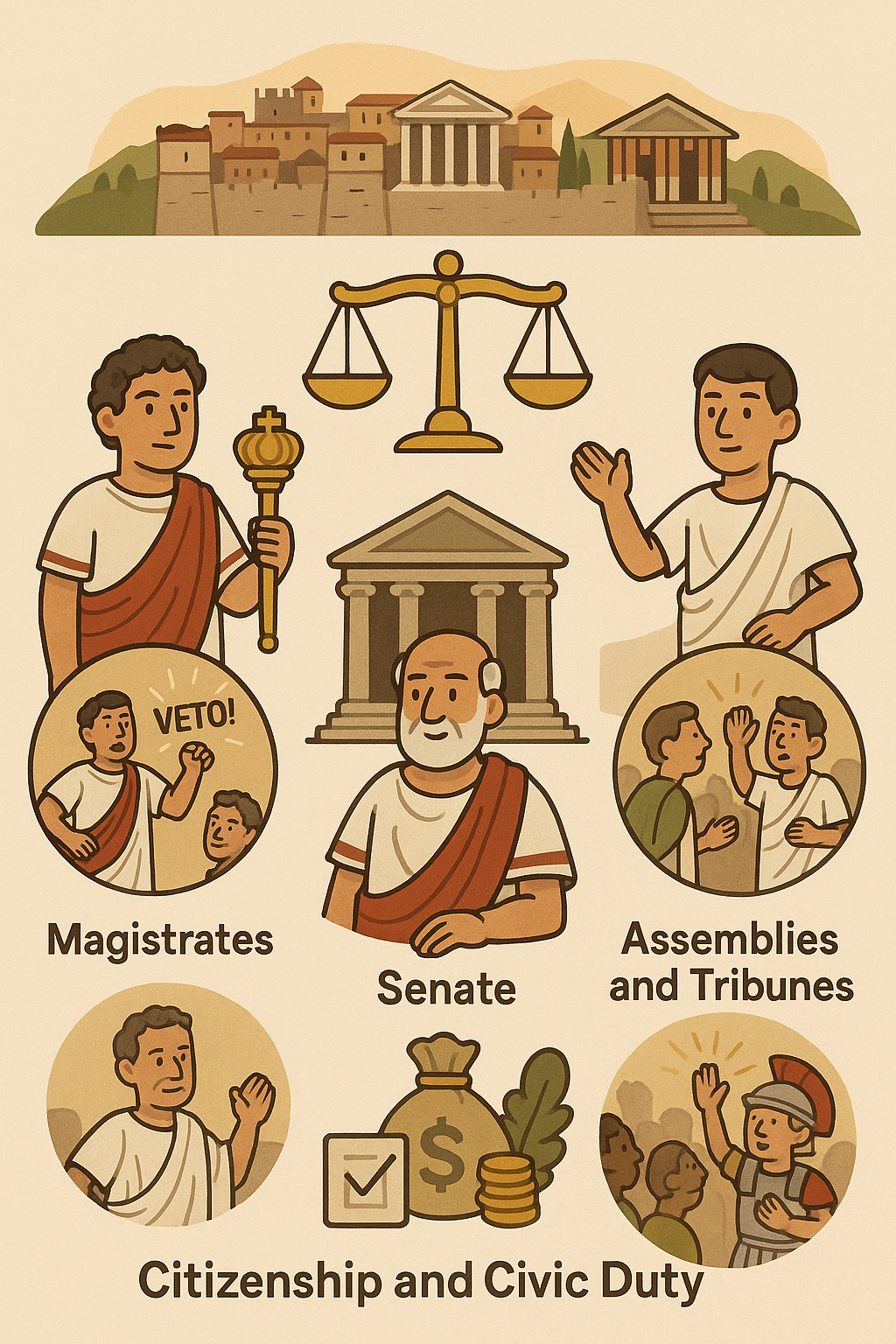Lesson 2: The Roman Republic (Ancient Rome)
The Roman Republic
A long time ago, Rome was ruled by kings. But the people wanted more power, so they created a new government called The Republic in 509 BCE. In a republic, leaders are elected and people have a say.
⚖️ Roman Government
Rome's government had three parts, like a tripod, to share power:
👑 Magistrates
Magistrates were important leaders. The top two were called consuls. They led the army and made decisions. But they only had power for one year—so they wouldn't get too powerful.
Fun fact: One consul could stop the other by saying “Veto!”, which means "I forbid."
🏛️ Senate
The Senate was a group of old, rich men (usually former magistrates). They gave advice and controlled money and foreign policy.
Story: The Senate was like the wise grandpas of Rome—always talking, giving advice, and trying to stay in control.
🗣️ Assemblies and Tribunes
Regular citizens voted in assemblies. They chose leaders and made laws.
The tribunes were special leaders who protected the poor (plebeians) from unfair laws. Tribunes could also veto laws they didn’t like.
Cool story: Once, a bad magistrate tried to take land from the poor. The tribune shouted “VETO!” and saved the land!
🧑🤝🧑 Citizenship and Civic Duty
Being a Roman citizen was a big deal. Citizens had rights—but also duties.
They had to:
Vote 🗳️
Pay taxes 💰
Serve in the army 🪖
Fun fact: Even poor Roman men were proud to be citizens. One soldier once said, “I fight not for gold, but because I am a Roman!”
🛡️ What Are Checks and Balances?
Checks and balances means that no one person or group in the government can have too much power. Each part of the government can stop the others if they try to do something unfair or too strong.
Think of it like this:
If one friend tries to take all the toys, the other friend can say “No!”
In Rome, if one part of the government tried to do something unfair, another part could say no.
This helped keep the government fair and balanced.
Example in Rome:
Magistrates had power, but only for one year.
Senate gave advice and controlled money—but they couldn't make all the decisions.
Assemblies and tribunes could vote on laws and veto unfair actions.
What does “veto” mean?
Veto means “I forbid.”
If someone tried to make a bad law, a tribune could stop it by saying “Veto!”
Simple Metaphor:
Imagine the Roman government like a three-legged stool:
If one leg is too long, the stool falls.
But if all three legs are the same size, the stool is strong and balanced.
That’s what checks and balances do—they keep everything fair and standing strong!
📜 Written Laws Keep Order (The Forum)
At first, only rich people knew the laws. Poor people said, “That’s not fair!” So Rome wrote the laws down in Twelve Tables.
They put the laws in the Forum—the center of the city—so everyone could read them.
Cool story: A boy once asked his dad, “What’s the law?” The dad took him to the Forum and said, “There it is, for all to see!”
🏘️ Life in Ancient Rome
Roman life was busy!
Rich Romans had big homes, with gardens and slaves.
Poor Romans lived in tiny apartments and worked hard.
People ate bread, olives, and cheese.
Kids played with toys and went to school (boys more than girls).
The Forum was a place to shop, talk, and hear news—like a market and social media in one!
🌍 Growth of Territory and Trade
Rome wanted land and power. They fought wars and made allies. They also traded with other lands.
They built roads and used ships to move goods.
They got grain from Egypt, silver from Spain, and glass from the East.
Interesting fact: Roman roads were so good, some are still used today!
⚔️ Rome Grows Beyond Italy – The Punic Wars
Rome wanted control of the sea. But Carthage, a city in North Africa, said “No!”
So Rome and Carthage fought three big wars, called the Punic Wars.
🐘 The most famous story:
A Carthaginian general named Hannibal took elephants over the Alps Mountains to attack Rome from the north!
Romans were scared, but strong. They finally won. Rome destroyed Carthage and became the strongest power in the Mediterranean.
🏛️ Why It Matters
The Roman Republic gave the world ideas about:
Voting
Rights
Laws
Fair government
Even today, we still use some Roman ideas in our governments!
